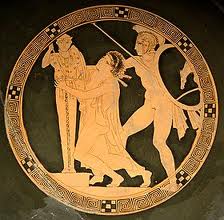- Ancient writers were aristocrats, they didn’t know what it was like to be a slave, to be a Sometimes masters would breed slaves
- If someone who was freed, had children with another non-citizen, the children were free but had limited rights,
 not citizens
not citizens
Sources – worthless because masters always shown the slave as goofing off or lying or being lazy
– In Greek half there are no writings of slaves from an actual slave or even a free person
– Slaves were forced to work hours on end outside in heat so of course they’re going to lie and be lazy
– Sometimes we get a little glimpse if an aristocrat talks about how he got mad and did something to his slave
– No stats available, don’t know how many there were
– Don’t know what it’s like to be someone who knows that they’re children will be slaves and after that and so on
– Not a Greek, a Roman, a Jew or Christian said anything about not having slaves, everyone in this time period believed that it was vital to have a slave in society, even ex-slaves, they hope one day they’ll get themselves free and one day they can have their own slaves, only once in a while did you hear that they should be more nice to slaves
Aesop
- An ex-slave, he didn’t write about his slavery, he wrote fables, like the lion and the mouse, the tortoise and the hair
- Apparently was very well endowed and the woman who owned him freed him
Conventions/ stereotypes
- Greek lifestyle, including democracy, couldn’t exist without slaves and the grunt of slaves
- Analogous to our lifestyle in the way we abuse the environment to have our lifestyle
Slave Population
No information but usually every family could afford at least one slave, if you didn’t have one you were very poor, it was like not having a car, so probably 1/3 of the population were slaves
Cost
- Not too expensive but a mark of poverty if didn’t have at least one
- How many slaves per citizen?
- Very wealthy people had about 15 slaves, but no more, not like Romans
Occupations
Mining WORST OCCUPATION
- In comedies, a threat would be to a slave that they would be sold to someone who owns a mine
- Death rate was so high, mines would collapse, high toxins
- Tiny children would do this or people who were already sick
- Put down beneath the ground before sunrise and didn’t let them out until after sunset
Manufacture
If you’re lucky slave, you had a skill, like literacy, because then the master would treat you better, instead of being worked to death, if you could make beautiful pottery, weapons, and if you got sick your master would send for a doctor. If you’re really lucky, a master being an entrepreneur would say, here start up your own business, I get 80% and you get 20% and when you get enough money you can buy yourself out of the slavery, this encourages the slave to actually work hard
Public building
- If you have three slaves and business is slow, the masters could always rent them out, say to Athens for a building project, or to another master, always making maximum use of slaves
Domestic slaves
- One slave who is a dormant, one slave who is a butler, a waiter, a clothes maker, a hair dresser
Prostitute and entertainer
- Some prostitutes were women who were just free, but many were bought and raised to be a prostitute (men and women)
Public slaves
- Athens was so suspicious of any one citizen having power so they had no police, they didn’t want to give the power to anyone to put someone in hand cuffs, they could only bring them to court
- If there was some drunk who was wandering around damaging and assaulting, no free citizen could restrain another free citizen
- Public slaves who were owned by the Goddess Athena and Athens itself had the right to restrain, and only restrain, not arrest or anything else, a drunk person, as they were believed to be acting on the Goddess Athena, Athens didn’t trust any free person, whether or not they were a citizen, to have the power to restrain anyone
- These people HAD to be slaves, and mostly used Russian
- Though these people couldn’t marry or own property
Trade and banking
- Masters could tell the slaves to run their bank, or bread shop, running their business, and the incentive would be getting a cut of the income
- ‘slaves living apart’
- Some Greeks didn’t like this because these slaves were pretty much indistinguishable from free men
- ‘wage-earning slaves’
Legal rights of slaves
- Slaves were just property
- Were bred, abused, broken up, raped
- Though sometimes we hear of masters who were too brutal, and occasionally another citizen would bring them to court and say the Gods won’t like the way you’re treating the slaves
Resistance
- murder, flight
- Rarely hear about this because there is nowhere for the slaves to go, no one would take them in because the person who did that could be sued for theft
Manumission, not a citizen
- Some masters had an economic technique, that a hopeful incentive was better than a whip
- A lot of the slaves were free, never citizens but became very wealthy and lived comfortable lives
